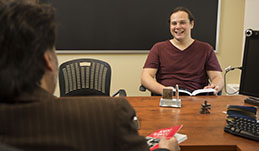Research
Honors
Established in 1960, the Honors Program at Moravian University provides qualified seniors the opportunity to pursue a yearlong intensive study of a subject of special interest. To participate in Honors, students must have an overall QPA of 3.0, with 3.3 in the proposed field of study. Usually, but not always, the project is in the student’s major. Applicants must propose the topic and secure the support of a faculty member (or members) to supervise the project. In the fall term of the senior year, Honors candidates carry out their research; in the spring, they prepare the Honors paper and defend their work before a panel of five faculty and staff members, one of whom may be from another institution.
2022
Danielle Hanson
From Buddhism to Stoicism: How Philosophy Can Help Us Cope with Anxiety
Advisor: Carol Moeller
2017
Nathan Nocchi
The Dilemma of Divine Foreknowledge and Human Freedom
Advisor: Arash Naraghi
2016
Monick Perone
Phenomenology of Gender: Deconstructing the Binary
Advisors: Arash Naraghi / Leon Niemoczynski Philosophy
2014
Kasey Smith Ojibway
Environmental Ethics: A Model for Contemporary Ecology
Advisor: Bill Falla
2012
Armando Chapelliquen
Huntington, Impact, and Occupy: The Makings of a New Global Paradigm
Advisors: Bernardo Cantens / Gary Olson
2011
Sienna Mae Heath
Speaking, Writing, and Typing: Human Voices of Communication
Advisors: John Black / William Falla
2006
Jerry N. Piotrowski
The Secret Identity of a Fractal Reality: Uniting Heraclitus and Parmenides
Advisor: Carol Moeller
2004
Joseph M. Dougherty
Moral Attributability
Advisor: Jonathan Kastin
2003
Morris Balacco
On Subjective Naturalist Theories of the Meaning of Life
Advisor: Jonathan Kastin
2002
Adam Fiske
Libertarianism, Redistributive, and Feminist Conceptions of Equality
Advisor: Amy Baehr
2000
Michael Susek
On the Moral Considerations of Living Entities: Biocentrism, Ecocentrism. And the Logic of Domination
Advisor: Amy Baehr
1999
Robert D. Gingrich II
Nietzsche and Hesse: The Lives and Philosophies of Two Outsiders
Advisor: Amy Baehr
1996
Anne Marie Cusack
An Ecofeminist Ethic of Caring
Advisor: Dr. Hwa Yol Jung
1993
Shawn Wright
The Emergence of Care: Justification and Implications for Moral Theory
Advisor: James Yerkes
1985
Laura S. Rowe
Law and Private Morality: Not Society’s Business
Advisor: Frederick W. McConnell
1982
Keita Harley
Hume’s Dialogues Concerning Natural Religion and the Search for a Natural Theology
Advisor: Frederick W. McConnell
1981
John M Midgley
Christian Realism and Recent History: An Analysis and Application of Reinhold Niebuhr’s Philosophy of Politics
Advisor: Frederick W. McConnell
1980
Douglas Anderson
A Challenge to Determinism
Advisor: Frederick W. McConnell
1975
Jeffrey L. Welaish
Socio-Cultural Determinism, Subjectivism, and the Objectivity of Ethics
Advisor: Frederick W. McConnell
1975
Barry Yeakel
The Naturalism of John Dewey: A Critical Analysis
Advisor: Frederick W. McConnell
1974
Edward J. Lentz
A Comparison of the Linguistic Philosophy of the Middle Ages and Contemporary Analytic Philosophy
Advisor: Frederick W. McConnell
1974
Bernard V. O’Hare
Why Me, Lord?: A Metaphysical Approach to the Problem of Evil
Advisor: Frederick W. McConnell
1969
Edwin H. Gianelli
Aristotle & Kant: Their Theories of Categories
Advisor: Frederick W. McConnell
1967
James G. McBride
Paul Tillich’s Interpretation of God
Advisor: Frederick W. McConnell
SOAR Research
SOAR (Student Opportunities for Academic Research) provides stipends, travel allowances, and expenses for students engaged in research or creative activities through close interaction with a faculty mentor. The program helps Moravian students gain a better understanding of scholarship in their discipline, and fosters scholar-colleague relationships. SOAR stipends can be as high as $3,000 for summer work.
From Buddhism to Kierkegaard: How Philosophy Can Help Us Cope with Anxiety
In her summer SOAR research, Danielle Hanson '22 takes a look at anxiety and how philosophy can be used as a tool to cope with both daily anxiety, and anxiety disorders.
Realism, Anti-Realism, and the Representation Problem
In his summer SOAR research, Michael Bassil '19 explores the realist/anti-realist debate in metaphysics and epistemology.
The Nature of Free Will in Light of Contemporary Neuroscience
In his summer SOAR research, Nathan Nocchi '17 analyzed recent experimentation within the field of neuroscience pertinent to the question of volitional power.

The Epistemology of Disagreement and Subsequent Philosophical Problems
In his summer SOAR research, Zachary Molchany '16 zeroed in on peer disagreement, or the disagreement among experts in a field who are equals.

"Abortion is Morally Wrong: An Analysis of Rights and Personhood"
Brian Welsko '14 examined the moral ethics behind the complicated issue of abortion rights.
Past SOAR Research
Independent Study
The Independent Study program allows students to delve deeply into areas of personal interest with the support of senior-faculty members—an unusual opportunity at the undergraduate level. Independent Study provides students with a chance to undertake a program of supervised reading, research, or artistic production not provided within existing courses. The Independent Study option is available to students who have junior or senior standing with a cumulative QPA of at least 2.70. Transfer students must have completed one fall or spring term of study at Moravian University before taking on Independent Study. An Independent Study earns one course unit. Students may schedule no more than one Independent Study or Honors course unit a term to a maximum of four over the period of the junior and senior years. Independent Study may be taken in any term, including the summer. A student may not take more than one Independent Study during the summer and must register for it no later than the beginning of the second summer session.
